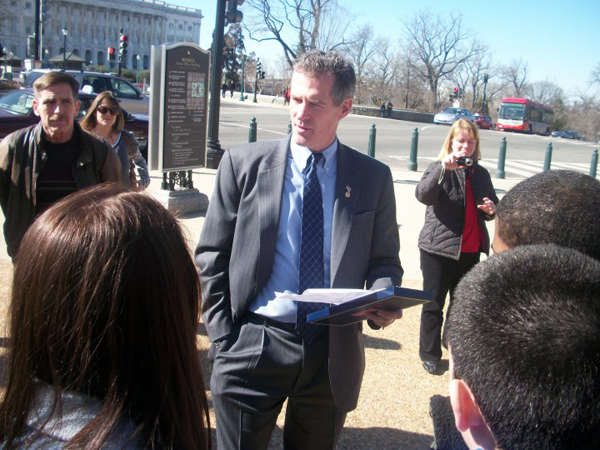It's Hard to Argue, Politically, with Scott Brown's Policy Record
 Photo by Gabi Hernandez via Wikimedia Commons
Photo by Gabi Hernandez via Wikimedia Commons
Scott Brown’s new campaign video, “Let America be America Again,” contrasts the current economic state of the country under President Obama with that of past generations. A dramatic score carries the words of past Democratic presidents (along with the required dose of Reagan) as they hail industry and hard work. The tone shifts when the camera turns to Obama and Elizabeth Warren, playing the President’s recent gaffe—“You Didn’t Build That”—with a similar quote from Warren. Brown enters toward the end of the video to address small-business owners who’ve felt slighted by Obama and Warren: “We should not be blaming you, we should be thanking you.” Brown’s support of small business is a prime example of why he’s a difficult candidate to run against—the issues he backs are politically popular and, in many cases, impossible to oppose.
“Housing for Families of Ill and Injured Veterans” is the latest bill introduced by Brown, and it’s a great example of a valence issue, or an issue that is consensually agreed upon by society. Even in our partisan-heavy Congress, there are some topics that will always be one-sided issues, and Brown has been building a policy resume heavy on valence issues, and other causes like small business advocacy that, while not classic valence issues, are tremendously popular in the political arena.
A major reason for Brown’s collection of these sponsored bills is his Senate committee involvement. Brown is currently on four: Armed Services, Homeland Security and Government Affairs, Small Business and Entrepreneurship, and Veterans’ Affairs. Of course, Brown is a Lieutenant Colonel in the Army National Guard, making him a great person to draft policies concerning veterans. The list of bills Brown has sponsored shows a Senator who has used his position to promote worthy causes but seems hesitant to be the one to make difficult and unpopular policy decisions.
He’s often left those decisions to other Republicans in the Senate. Brown has promoted himself as an independent voter, and appears to have lived up to that promise, voting with Republicans 68 percent of the time. But a recent study by ProgressMass evaluated Brown’s voting record on legislation that already had the support of 50 or more senators, and tracked the cases where Brown voted with Republicans to obstruct the bill. In those scenarios Brown has voted with the Republican opposition during his Senate tenure 75.5 percent of the time, including 93.8 percent of the time before Warren entered the race, when media scrutiny wasn’t at pre-election levels. “Analysis of these 53 roll call votes resulted in findings roundly discrediting Brown’s recent claims of bipartisanship,” concluded Mathew Helman, communications director at ProgressMass.
This study supports Warren’s claims that on important issues like financial reform, Brown is more of a hard-line Republican than he lets on, but Brown’s campaign has been masterful at keeping the message simple and pointing to legitimate policy attempts to bolster his image as an advocate for veterans and the small business community. By avoiding bold policy-making, he’s been able to dodge the backlash against unpopular proposals like Congressman Paul Ryan, R-Wisconsin, has endured for his budget that would curb Medicare spending, among other cuts.
Scott Brown’s campaign slogan this election is “He’s for Us.” In some ways that slogan is correct—I’m sure just about everyone in the Commonwealth would support legislation he’s proposed to protect the elderly and fight human trafficking. Bills like those are politically favorable and a good public service. But part of being a leader in Congress is also about tackling difficult, messy issues that don’t leave everyone happy. Brown has proven he can hit policy softballs, but let’s see if he’s willing to take a swing at coming challenges like the deficit, climate change, or education, which can all be as tricky as a Tim Wakefield knuckleball.
Update, 08/03/2012 1:10 p.m.: Edited to correct the time frame of the ProgressMass results. We regret the error.

